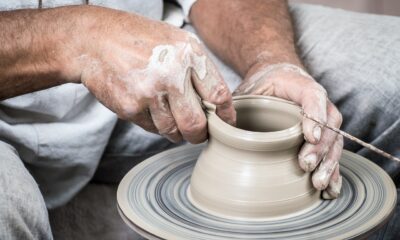News Items
7 Expert Tips for Reducing Outdoor Winter Dangers for Older People
Get expert tips on reducing outdoor winter dangers for older people. Learn how to pretreat walkways, mitigate tripping hazards, and ask for help. Stay safe this winter!
Even if the first snowflakes have just begun to fall, it’s important to start thinking about winter yard care and cold weather safety for older individuals who are aging in place. Limited mobility and dangerous conditions can create a challenging situation for seniors, especially those with health issues who live alone. However, taking proactive steps such as pre-treating walkways, mitigating tripping hazards, and asking for help can make a tremendous difference. In this article, we’ll share expert tips on how to reduce outdoor winter dangers for older people, ensuring their safety and well-being during the colder months.
Winter Safety Tips for Seniors: How to Reduce Outdoor Dangers
Winter can be a challenging season for seniors, especially those who are aging in place. Limited mobility combined with harsh weather conditions can create potential dangers for older adults, particularly if they have health issues and live alone. However, with proper planning and precautions, it’s possible to reduce outdoor hazards and ensure a safe and enjoyable winter season. In this article, we will provide you with expert tips on how to keep yourself or your elderly loved ones safe during the winter months.
Pretreat Walkways and Driveways
The first step in preventing accidents and injuries during the winter is to pretreat walkways and driveways. Sprinkling salt or using ice melt before a snowfall can go a long way in preventing back-straining shoveling of wet, heavy snow. According to Missy McAuley, a nurse and director with Bethesda Home Health, a St. Louis-based senior living and service organization, pretreating walkways and driveways can make a significant difference in reducing the risk of falls and injuries. Additionally, Michelle Glass, Bethesda’s vice president of senior living and in-home services, recommends using snow-melting mats like those made by HeatTrak. These mats can melt up to 2 inches of snow per hour and are designed to be left out for the entire winter, providing a safe and hazard-free pathway.
Mitigate Tripping Hazards
Falls are a common risk for seniors, especially during the winter months when slippery surfaces are abundant. To mitigate tripping hazards, it’s important to invest in waterproof boots with non-skid and non-slip soles. These boots provide extra traction and stability when walking on icy or snowy surfaces. Additionally, replacing rubber tips on canes and walkers can significantly improve stability and reduce the risk of slips and falls. It’s also important to remove shoes when entering the home to prevent water pooling and potential slips. When choosing welcome mats, opt for sturdy and non-slippery options to avoid tripping hazards.
Ask Others for Help
If you or your elderly loved ones need assistance with snow removal or other outdoor tasks, don’t hesitate to ask for help. Reach out to local senior centers for information about programs and resources available in your community. These centers often have connections with organizations or individuals who can provide area shoveling and plow services. Additionally, church youth groups are often willing to assist during inclement weather and throughout the winter season. Consider hiring local landscapers for snow removal, as they often offer services beyond cutting grass in the warmer months. Requesting help from others can lighten the load and ensure a safer outdoor environment.

This image is property of www.cincinnati.com.
Clean Out the Gutters
Cleaning out the gutters is an essential task to tackle before winter fully sets in. Wet, slippery leaves under snow can create trip hazards, so it’s important to bundle and remove fallen leaves in autumn. Clogged gutters can cause structural damage to homes and lead to the formation of slippery ice due to improper drainage. However, it’s important to note that gutter checks should be performed by others, not the elderly individuals themselves, due to potential balance and sight issues. Asking for assistance from family members, friends, or professionals can help ensure the gutters are properly cleaned and maintained.
Install Outdoor Flood Lights
Proper lighting is crucial during the winter season, especially for seniors with vision impairments. Adding outdoor flood lights to illuminate walkways and driveways can significantly reduce the risk of trips and falls. When choosing flood lighting, it’s important to think from the top down, as shorter outdoor lamps along walkways and driveways can easily be covered by snowfall. Solar lights are easy to install, but they may not receive sufficient sunlight during winter and may be less durable and brilliant. Consider using LED flood lights for better visibility and reliability during the winter months.
Shore Up the Walkway
Before the ground hardens, it’s advisable to install or upgrade handrails and address any debris or chipped concrete along the walkway. Handrails can provide much-needed support and stability, especially when navigating icy or slippery surfaces. It’s also important to check for any debris or chipped concrete that can cause falls or injuries if left unaddressed. Taking these preventative measures before the arrival of snow or ice can help create a safer walkway and minimize the risk of accidents.
Ask for Municipal Accommodations
Reducing risks and ensuring the safety of older adults during the winter months often requires seeking accommodations from the local municipality. For example, seniors can inquire if mailboxes can be installed closer to their doors, eliminating the need for a treacherous walk down a driveway in snowy or icy conditions. Similarly, asking if trash pickup services can be provided closer to the garage or door can minimize the time spent outdoors in potentially hazardous weather. Don’t hesitate to reach out to local authorities to explore options for making daily routines safer and more convenient.
Dress Appropriately for the Weather
Dressing appropriately for the weather is crucial for staying warm and comfortable during the winter months. It’s essential to wear warm clothing, including hats and gloves, to protect against the cold. Layering clothing provides additional insulation, allowing you to adjust your attire based on comfort levels. Scarves and face masks can also help protect against cold winds and reduce the risk of frostbite. By dressing sensibly and ensuring adequate protection from the elements, you can enjoy outdoor activities without compromising your safety and well-being.
Stay Active and Exercise Indoors
Regular physical activity is important for maintaining overall health and well-being, even during the winter months. Engaging in indoor exercises can help seniors stay active and improve strength, flexibility, and balance. There are numerous exercises that can be done indoors, such as chair exercises, yoga, tai chi, or using resistance bands. Following fitness videos or joining online exercise classes can provide guidance and motivation for staying active at home. By incorporating regular physical activity into your routine, you can stay healthy and reduce the risk of falls and other health issues.
Monitor Indoor Air Quality
Indoor air quality can have a significant impact on overall health, especially during the winter when people spend more time indoors. Ensuring proper ventilation is crucial to prevent the accumulation of pollutants and maintain clean air. Regularly cleaning and maintaining heating systems and filters can improve air quality and reduce the risk of respiratory issues. Consider using air purifiers to further enhance indoor air quality. By monitoring and improving indoor air quality, you can create a healthier and more comfortable living environment.
In conclusion, taking proactive steps to reduce outdoor dangers is essential for seniors during the winter months. From pretreating walkways and driveways to asking for help with snow removal, these expert tips can help older adults stay safe and enjoy the winter season. By mitigating tripping hazards, addressing gutter maintenance, installing outdoor flood lights, and making appropriate clothing choices, you can significantly reduce the risk of accidents and injuries. Additionally, staying physically active indoors and ensuring good indoor air quality contribute to overall well-being and safety. Implementing these tips will help seniors age in place comfortably and securely throughout the winter season.












